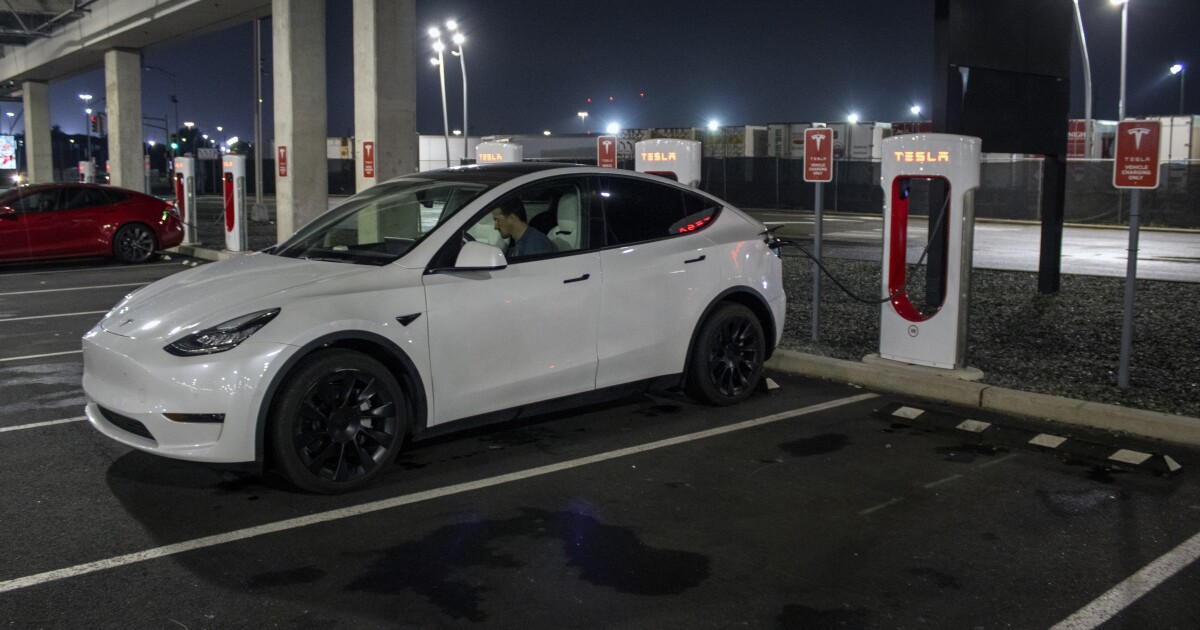

Nearly two years after President Joe Biden signed the bipartisan Infrastructure Investment and Jobs Act into law, significant funds have been allocated toward various infrastructure projects to push an expansion of electric vehicles.
Also known as the Bipartisan Infrastructure Law, the legislation couples with investments from the Inflation Reduction Act, the massive clean energy bill signed into law in August 2022.
GAVIN NEWSOM ENDORSES LATEEFAH SIMON IN RACE TO FILL BARBARA LEE’S HOUSE SEAT
According to an August report from the Environmental Defense Fund, a nonprofit environmental advocacy group, “56% of announced EV investments have occurred in the last 12 months since passage of the IRA and 80% have occurred in the last 21 months since passage of the Bipartisan Infrastructure Law.”
Below is a snapshot of where these investments stand.
Charging infrastructure
Under the legislation, states were allocated $7.5 billion to expand EV charging networks across the nation. Funds were expected to go toward projects that build more stations in cities along highways, and other public locations, hoping to place the chargers no more than 50 miles apart.
The overall funding directs $5 billion to the National Electric Vehicle Infrastructure Formula Program and $2.5 billion to the Charging and Fueling Infrastructure Program.
“To date, the Federal Highway Administration has made available $2.38 billion in National Electric Vehicle Infrastructure Formula funding to help all 50 states, the District of Columbia and Puerto Rico build a national network of EV chargers,” an FHWA official told the Washington Examiner.
NEVI, created under the bill, is overseen by the Department of Transportation and provides grants to state and local governments for EV infrastructure.
California and Texas have been issued the most funding from the national EV charging infrastructure network. In September 2022, the states were two of 35 total whose plans were approved to roll out additional charging stations over 53,000 miles of highway across the U.S. over the next five years. From fiscal 2022 through fiscal 2024, California has seen $220,231,162 in NEVI funding, while Texas is leading with $234,065,268, according to data from the Joint Office of Energy and Transportation.
In February, the Biden administration announced that all EV charging stations funded by the bill must be built in the U.S., and by July 2024, at least 55% of the price of all components must be manufactured domestically, too.
Battery manufacturing
The law allocated $7 billion for EV battery components including critical minerals and materials needed to produce the power system.
In October 2022, the Biden administration announced that 20 companies received $2.8 billion for battery production, supporting domestic manufacturers who need critical minerals that are located in just a handful of countries, risking depletion in the states.
In September, the Department of Energy’s Office of Manufacturing and Energy Supply Chains filed a notice of intent to provide $3.5 billion in new awards through the bill to expand battery manufacturers and improve domestic supply chains.
“It is a priority of the Administration to retain and increase good-paying jobs across the entire battery supply chain, including mineral processing, battery manufacturing for vehicles and storage, and recycling,” the notice from MESC said.
Enough batteries were made to power 224,700 vehicles in 2021 and increased to more than a million vehicles in 2022, according to the Environmental Defense Fund’s report. The environmental group predicts by 2027, domestic manufacturing capacity will increase to more than 12 million vehicles.
Development in jobs
This legislation is estimated to create more than 50,000 jobs connected to electric vehicle component and assembly plants, with many focused in California and Michigan.
According to the Environmental Defense Fund, 143,000 new jobs have been created in the last eight years in the electric vehicle sector — with 66%, or more than 94,000, created since Biden passed the legislation.
CLICK HERE TO READ MORE FROM THE WASHINGTON EXAMINER
Among the jobs documented by the Department of Energy, thousands of jobs have been created in the EV sector, including at General Motors and the Ford Motor Company. The department tracks jobs created from funds under the Inflation Reduction Act and Infrastructure Investment and Jobs Act. Thousands of EV jobs are focused in Northern California, varying in companies such as Tesla and Ryvid.
In April, the Biden administration revealed strict rules to accelerate the country’s transition to EVs. In the most ambitious plan, the president outlined his goals of having 100% of medium- and heavy-duty EVs by 2035.





